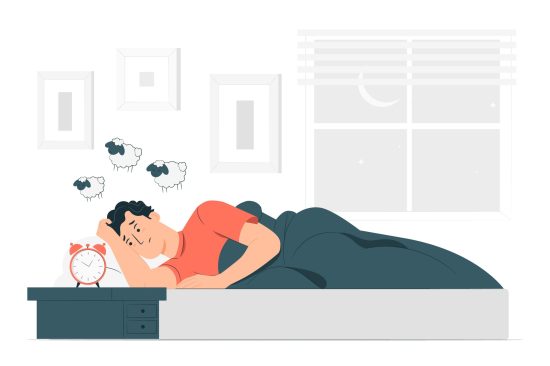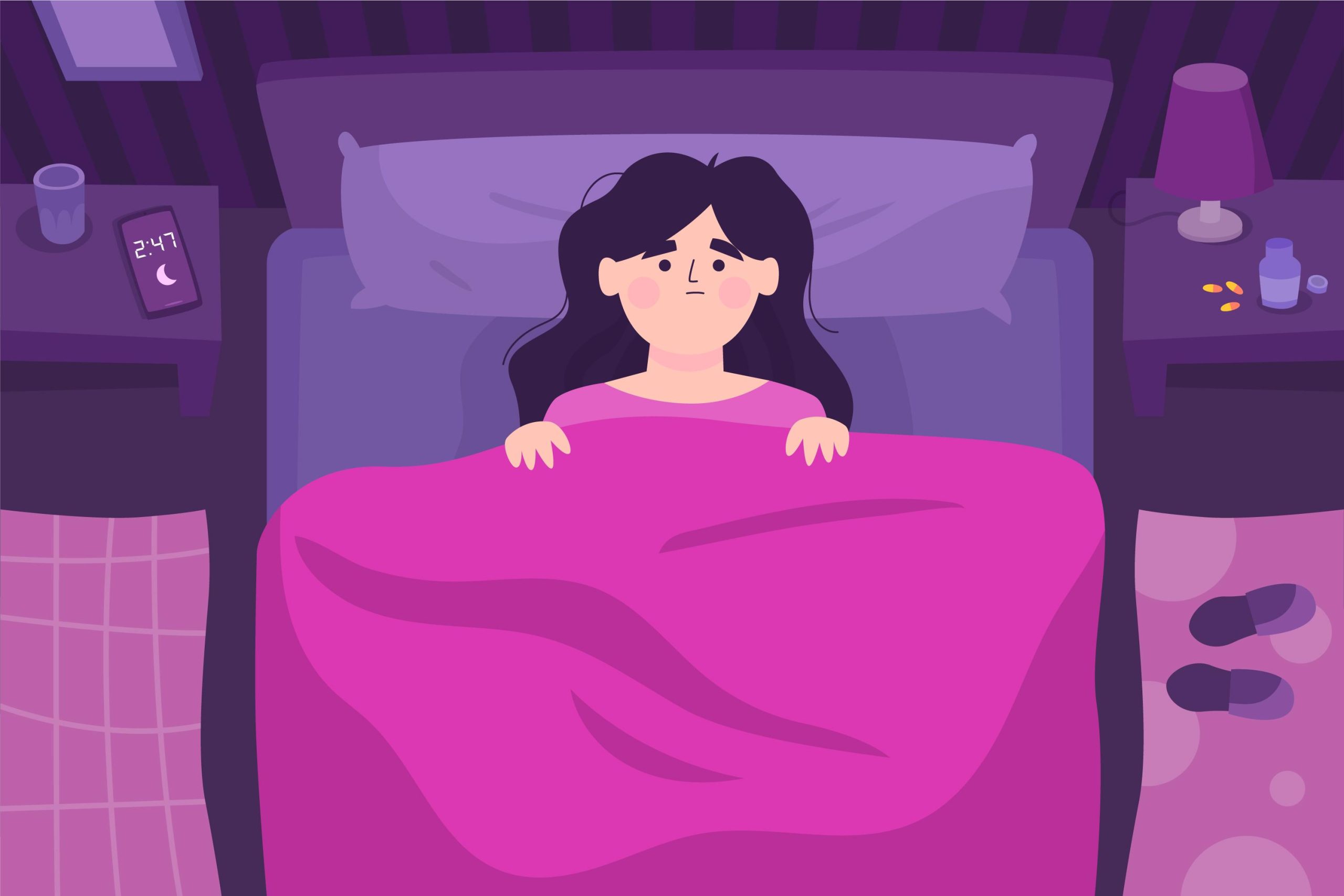
May is Better Sleep Month, shedding light on a lifestyle aspect often overshadowed by dieting or exercising. Despite its importance, many fail to recognize the critical nature of getting enough sleep. Surprisingly, neglecting sleep can have dire consequences, potentially more fatal than starvation. It takes just 10 days of going without sleep to kill you, whereas it takes 14 days to succumb to starvation. This highlights the vital need to prioritize sufficient sleep. Now, let’s explore the intricate relationship between sleep and mental health.
How Are Mental Health And Sleep Related?
Sleep disturbances sometimes are problems in themselves – due to long working hours or hectic lifestyles. However, some might be struggling with chronic sleep problems, which could be a symptom of an underlying, deep rooted psychological or an emotional concern.
Underlying anxiety can keep you awake: When you are feeling anxious, you will find that there are too many thoughts running through your mind and it becomes difficult to turn them off. There’s a need to keep engaging with them, thus keeping you awake at night. Over time, this can become an overwhelming pattern, making it hard to feel at rest and to fall asleep. Experts even say that lying in the bed when not feeling sleepy, can condition you to associate the bedroom with anxiety. If you are also experiencing night terrors, panic attacks and a persistent sense of restlessness then you may be facing significant anxiety related concerns and might want to seek help.
Change in sleeping patterns may be connected to depression: Sleeplessness in the form of early awakening, an inability to stay asleep and the tendency to sleep lightly could be connected to depression.
Those struggling with depression experience a sense of a total disinterest in daily tasks, a general lack of motivation and feel fatigued all the time. In some cases then, it is oversleeping (waking up late in the morning or sleeping a lot during the day) that serves as an escape from having to carry out regular tasks.
Stress affects the body’s ability to rest: Some of you may have the tendency to stay engaged in some activity or the other even when it’s time to sleep – like watching T.V. late into the night, surfing on the net, making a midnight snack, or reading. This means that there is some difficulty in feeling rested and it might be a sign of chronic stress.
Let’s understand how stress interferes with your body’s ability to getting enough sleep. In a crisis situation, where a decision has to be made, the body goes into a state of alarm, in order to act. The muscles tense, the heart rate increases, breathing becomes faster and the body releases adrenaline. By default, your body goes back to normal once the stressful situation has passed.
But when you find ourselves constantly under stress, your body ends up staying in this state of high arousal, causing problems in sleeping/making it difficult to sleep. Ironically then, though you might be feeling quite exhausted, you don’t feel at rest, when trying to go to sleep.
Let’s now look at how sleep problems themselves could actively contribute to disruptions in day-to-functioning and negatively impact mental health.
What Happens When You Are Not Getting Enough Sleep?

Several studies suggest that not getting enough sleep is in itself, a risk factor for developing mental health concerns. Neuro-imaging and neurochemistry studies indicate that a good night’s sleep helps foster both mental and emotional resilience, while chronic sleep disturbances, if left untreated, increases negative thinking and emotional vulnerability.
Here are some ways in which sleep deprivation can have a crucial impact on our overall functioning:
- It causes disruption in forming of memories:
Research shows that even when sleep-deprived for just one night, people are more likely create false memories of events observed. This is because, during the night, various sleep cycles play a role in ‘consolidating’ memories in the mind. Conversely, experts advise taking a nap right after going through material that you need to memorize, in order to remember it better. - Lack of sleep makes you more anxious:
If you are a natural worrier, not getting enough sleep can make you more anxious. A 2007 study found that sleep-deprived brains were 60 percent more reactive to negative and disturbing images. Researchers from the University of California, Berkeley, found that when a person is sleep-deprived, activity in the amygdala (the primitive part of the brain, responsible for emotional processing and looking out for threats) is increased. - It makes you more prone to making risky decisions:
When you are sleep deprived, it feels like you aren’t able to think clearly. That’s because lack of sleep hurts cognitive processes of attention, concentration, reasoning, and problem solving, thus increasing your chances of getting into impulsive, uninhibited behavior. - Cumulative sleep deprivation builds a sleep debt:
Ideally, most adults need around seven to nine hours of sleep each night for optimum performance and health. When you are not getting enough sleep, you accumulate something called as a sleep debt. Now, the common understanding most people have is that you can always ‘make up’ for lost sleep on the weekends or ‘once the deadline is over’.
However, that’s not true – you cannot reverse the impact of the lost sleep. What this means is that, if you mostly stayed up a couple of days or a week and instead slept in Saturday and Sunday doesn’t mean you’ll be entirely sharp Monday morning. The sleep that you missed out on during the week already affected your attention levels, which cannot be entirely reversed by your catching up weekend sleep.
The worst part is that the greater the sleep debt you carry, the more its effects worsen and the less capable you become, in even recognizing its effect. So when you grapple for long with the symptoms of sleep deprivation for long, you can hardly recall what it’s like to be fully rested and present.
- Implications on other aspects of health:
Over time, as sleep debt increases and you go for long without being fully rested, it puts you at a growing risk for developing hypertension, heart disease, diabetes, memory loss and unhealthy weight gain.
Use this post to reflect upon your sleeping patterns and share with us your observations, questions and comments. We will soon be posting a second-part to this article that will help you learn to sleep better!

Are you getting enough sleep?
Counseling can be a great tool for you to relax yourself and having a peaceful night's sleep.
We are here for you.
Frequently Asked Questions
There is no “right time,” for seeking help. Sleep issues can impact both the quantity and the quality of sleep. If you are struggling with your sleep and if you feel like it is affecting your ability to function daily, it is then a good idea to consult a mental health professional.
Sleep issues can definitely be triggered by certain lifestyle habits. For example, consuming too much caffeine post lunch hours, smoking, and eating a heavy meal for dinner can impact the quality of sleep. Sometimes, doing heavy and intense workouts can also increase the stress in the body, leading to disordered sleep. Therefore, it is always best to limit your caffeine consumption, reduce smoking, and opt for lighter workouts and meals in the second half of the day.
People can have varying sleep needs. However, an ideal range of the duration of a night’s sleep can be from 6 to 9 hours.
About the Author
This article was written by Sindhura Tammana. This post was consulted & approved by professional therapists practicing online therapy and counseling.
Ask a Therapist
If you are interested to know more about sleep disorders and other mental health topics, ‘Ask A Therapist’ is a platform for you to ask your questions related to Mental Health, Mindfulness & Emotional Well-Being to our team of qualified Therapists.




